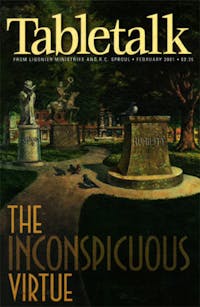
Request your free, three-month trial to Tabletalk magazine. You’ll receive the print issue monthly and gain immediate digital access to decades of archives. This trial is risk-free. No credit card required.
Try Tabletalk NowAlready receive Tabletalk magazine every month?
Verify your email address to gain unlimited access.
Men who do not understand their emptiness apart from God will not seek to be filled by God. As Thomas Watson put it, a hand clutching pebbles cannot be filled with gold. By contrast, however, those who have been made aware of their spiritual poverty—by grace—will turn to the God behind that grace to receive a kingdom through additional grace.
Consequently, humility of mind and of spirit lies right at the beginning of the Christian life. The Beatitudes are at the beginning of the Sermon on the Mount, and right at the beginning of the Beatitudes is our Lord’s great blessing of humility. Christ teaches us there that “ ‘Blessed are the poor in spirit, for theirs is the kingdom of heaven’ ” (Matt. 5:3). The word translated “poor” is ptochos, and it comes from a verb that means “to crouch”—the posture of beggars. “Blessed are the spiritually destitute, for theirs is the kingdom of heaven.” Or, from another angle, “Blessed are those who have nothing, for they have everything.”
And so we know, on the Lord’s good word, that the poor in spirit receive a tremendous blessing. But we still must be careful. If poverty of spirit is key, then one of the first things that pride will want to do is distort the definition of what it means to be humble. Counterfeits abound, so we have to ask the question: What does true poverty of spirit look like?
First of all, those who are truly poor in spirit have a good understanding of the greatness and sovereignty of God. As they see Him as He is, they are greatly humbled. “For thus says the High and Lofty One who inhabits eternity, whose name is Holy: ‘I dwell in the high and holy place, with him who has a contrite and humble spirit, to revive the spirit of the humble, and to revive the heart of the contrite ones’ ” (Isa. 57:15). Thus, poverty of spirit is, in the first place, humility before God. The God who dwells on high is the one who dwells with the man who is low.
When we entertain low views of God, we find that they always accompany high views of man. But the Bible teaches that God is gracious, and when He is high and man is low, He bridges that gap in His infinite grace.
But the poor in spirit are not, as we would say, full of themselves. They know that apart from Christ they are nothing—worthless. In an age consumed with the idea of cultivating a “good self-image,” this is a message that must be pondered carefully. This is because the notion of man’s spiritual bankruptcy is at odds with the current reigning dogma. If we say something like this, even in passing, it is sure to be challenged. We must be prepared to answer all such challenges because it is really the kingdom of heaven that is at stake. Jesus said that the kingdom would come to those who are poor in spirit. It is therefore a matter of some importance how that poverty is defined.
Consider the ramifications of the teaching in Romans 3. Everyone is unprofitable. No one seeks God. No one understands anything of any spiritual importance. Everyone is foul. In our feel-good era, this is a hard sell—even in Tabletalk.
We should notice in all this how our age disguises its pride as humility. In every culture, pride is seen as a challenge to the established god and humility is seen as obeisance before that god. In modern America, the reigning “god” is the individual self. Confidence about anything other than self is therefore dismissed as arrogance. In other words, arrogance (biblically defined) is the one thing that is not seen as arrogance, and every form of biblical humility is redefined as a form of pride. The man who says, “The Bible teaches …” is, by definition, a proud man. By contrast, the man who says, “It seems to me …” is defined as humble. But the former is pointing away from himself entirely, while the second fellow is talking about his own thoughts and feelings, and nothing else.
The poor in spirit are, consequently, perfectly content with the God-given terms of salvation. The proud are not, and cannot be. We have an English proverb that expresses this concept perfectly—“Beggars can’t be choosers.” But in contemporary evangelicalism, we tend to emphasize the choosing: go forward, volunteer, sign the card, decide for Christ—now. In the back of the mind of every person hearing the Gospel presented in this way is the thought that “I am being called upon to choose, and choose autonomously. I must not be a beggar. God don’t make no junk.”
The fact that so many demand the authority to choose their own salvation for themselves reveals that they are not yet poor in spirit. We must constantly remember Romans 9:18: “Therefore He has mercy on whom He wills, and whom He wills He hardens.” The only millstone that can grind the pride of man to powder is the stone of God’s sovereignty—the basis of all humility in man.
